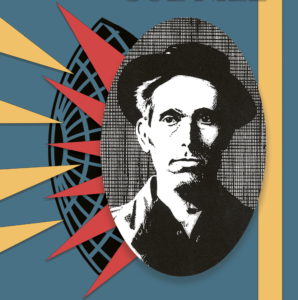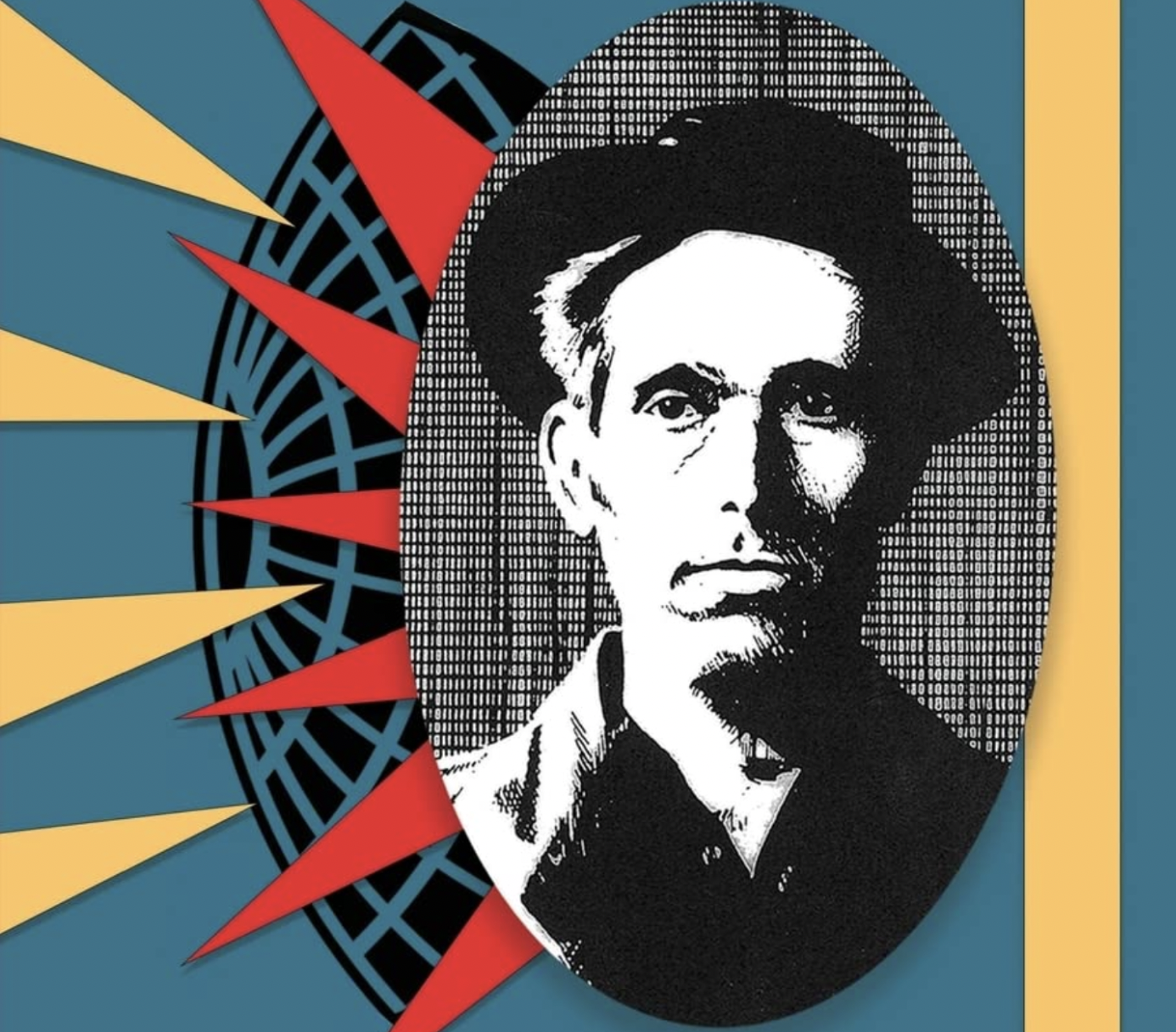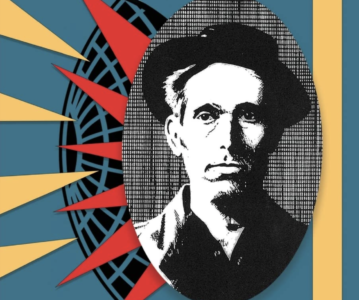Jackson Albert Mann responds to International Publishers’ new 2022 edition of Philip S. Foner’s classic work, ‘The Case of Joe Hill.’

Introduction
Many on the U.S. socialist Left today may be surprised to learn that the innocence of Joe Hill, the now-legendary IWW-affiliated songwriter and composer, was something of an open question for many decades, both in the field of labor history and in the popular imagination.1 Philip S. Foner’s 1965 book The Case of Joe Hill, which International Publishers has recently re-issued with a new introduction, was one of the first major scholarly interventions against the then-common sense: that Hill’s trial was clearly a farce, but he was most likely guilty of the murder of John G. Morrison, the Salt Lake City, UT grocery store owner who was shot and killed by masked men during a robbery on January 10, 1914. There was clearly a contradiction at the heart of this thesis, though, which admitted that the farcical nature of Hill’s trial was due to a flawed prosecution willing to convict him without direct evidence, while continuing to assert the same verdict.
Indeed, the only tenable position on the Joe Hill case is that which Foner articulated in his conclusion sixty years ago: that Hill’s innocence or guilt could not have been meaningfully established in the context of what could only be described as a show trial. However, as Foner pointed out, one need not believe that Hill was the victim of a meticulously pre-planned conspiracy “to get rid of a militant union organizer,” as many on the Left had claimed.2 Rather, Hill’s arrest was legitimately based on circumstantial evidence linking him to the case. However, once “the Salt Lake City police and the Utah authorities learned… that [Hill] was active in the I.W.W., his constitutional rights went out of the window.”3 For the SLCPD, Hill, with his revolutionary credentials, represented an easy conviction that could distract the local middle class public from a recent spate of murder cases which they had been unable to solve. For regional capital, the case was a golden opportunity to demonize socialist, labor, and other left-wing elements. And so, as a result of the immediate needs of the local police and business class, Hill’s initially reasonable status as a suspect was rapidly transformed into a political conspiracy to convict him of the murder by any means necessary. As Foner argued, the facts of the case could never have been established convincingly under such circumstances, and so we must presume Hill’s innocence.
Longtime Jobs With Justice activist, Erica Smiley, has provided a new introduction to International Publisher’s 2022 re-issue of The Case of Joe Hill. She passionately links the Joe Hill case to contemporary struggles by historically connecting the methods of repression used by capital and the state against the U.S. working class of the past to those of today. Smiley is certainly correct that there is relevance to Foner’s text from this perspective. The continuity of the U.S. state’s domestic police and intelligence arms makes an analysis of the way in which the political conspiracy against Hill unfolded useful. Although, it should be noted that U.S. socialists who are interested in the history of domestic repression may do better to read Robert Justin Goldstein’s epic 1978 study of the topic, or more recent work by Aaron J. Leonard and Connor A. Gallagher.4 Indeed, there are other, deeper reasons for the relevance of a new edition of The Case of Joe Hill that Smiley fails to mention, specifically the text’s central role in Foner’s controversial legacy as one of the U.S.’ most prominent communist labor historians, as well as its part in re-producing a not-always-helpful folkloric understanding of Joe Hill and the culture of the IWW.
The Plagiarism Issue
In 2003, ten years after Foner’s death, labor historian Melvyn Dubofsky accused the former of “borrow[ing] wholesale from [his] then unpublished dissertation” on the history of the IWW.5 Dubofsky claimed that this material was used, without permission, in the fourth volume of Foner’s encyclopedic 10-volume History of the Labor Movement in the United States.6 In other words, Foner was guilty of plagiarism. Dubofsky’s claim sparked a wave of denunciations of Foner by other labor historians as a “left-wing hack” and “repeated plagiarist” who stole “vast amounts of material” throughout the entirety of his career.7 Although Dubofsky claimed that he had personally uncovered so many instances of plagiarism in Foner’s work that they were “too numerous to mention,” none of the accusations made in the heat of May 2003 were ever systematically investigated.8
However, this was not the first time that Foner had been publicly accused of plagiarism, and this formed the locus around which these new claimants could assert their own credibility. Just over thirty years earlier, in 1971, James O. Morris, a professor of labor relations at Cornell University, claimed Foner had plagiarized large chunks of an unpublished thesis manuscript he had written in 1953 and deposited in the University of Michigan’s Labadie Collection. The work in which Morris had found this possibly stolen material was The Case of Joe Hill. In the pages of Labor History, Morris demonstrated, through line-by-line analysis of both the texts, that a number of passages in Foner’s book bore an unsettling resemblance to parts of his own work on the topic.9
But the issue, for Morris, was made confusing by the fact that Foner cited him profusely throughout the text. Indeed, Morris’ manuscript is one of most consistently cited secondary sources in the endnotes of The Case of Joe Hill. Foner even dedicated four separate notes to extended commentary on Morris’ opinion that Hill was likely guilty and how his own interpretation of the evidence differed. Morris’ article ended on an uncertain note, the final section wrangling over the specifics of how the manuscript was cited in an attempt to make sense of Foner’s inexplicable willingness to engage at length with a text he was plagiarizing.10
The issue was made even more unusual by Foner’s reply, which was included in the same issue of Labor History. In this letter, Foner seemed puzzled by the accusation. He openly admitted that reading Morris’ work he had been “struck by the fact that there was indeed a great resemblance between” their texts, but believed that his numerous citations and critical engagement with Morris’ research did justice to his manuscript.11 Foner pointed out, correctly, that all the passages that Morris analyzed were those which followed the details of the courtroom case as it unfolded, often paraphrasing the words of contemporaneous reports and documents. So, according to him, it was unsurprising that these highlighted passages resembled one another. He then went on to point out, again correctly and seconded by Morris himself, that a substantial amount of The Case of Joe Hill was entirely original research using documents previously unknown to U.S. labor historians. A final rejoinder by Morris was also included, in which he replied to Foner’s letter with an appeal to fellow historians to judge the situation for themselves. But, there is no evidence that scholars took much interest in providing their own professional assessment.
What exactly does one make of this? The article’s systematic analysis of both texts proved beyond a doubt that Foner, even if he did include much original material, most definitely replicated Morris’ presentation of the available evidence regarding the specifics of the case’s courtroom proceedings, at many points reaching the level of verbatim reproduction, i.e. plagiarism. Yet, Foner’s letter reveals a sense of perplexity at the accusation, the genuineness of which is proved by his willingness to prominently cite and engage with Morris’ manuscript, something one wouldn’t expect a scholar to do with a work they were stealing from.
As academia journalist Scott McLemee detailed in his retrospective of the 2003 controversy, Foner, as a result of his well-known communist politics, spent the bulk of his life outside the world of official academia and did much of his work without institutional support. This often led, according to historian David Roediger, to what Foner termed “processing errors.”12 Responding to continuing rumors stemming from the Morris controversy towards the end of his life, Foner admitted that he had made mistakes as a result of his struggle to organize his enormous collection of primary documents, secondary sources, and notes without conventional academic backing for his work. “Sometimes [I] can’t tell what’s what,” Roediger recalls Foner saying in reference to his personal archive when confronted about his scholarly integrity.3 Indeed, Foner did plagiarize Morris, that is obvious, though whether he did so intentionally is not clear. The most generous reading of the situation is that Foner really did mistake a number of copied out quotations of Morris’ text for his own notes on the manuscript.
Still, Foner has gained a reputation for plagiarism of “vast amounts of material.” The credibility of this claim, however, relies entirely on this single article from 1971. Foner, as both a fellow socialist and a labor historian whose scholarship entails a virtual encyclopedia of the U.S. working class, should not be dismissed without a proper interrogation. Unlike the Joe Hill case, where a political conspiracy and missing documents have created a situation in which we can never be sure of what happened, Foner’s corpus and the work of those who have accused him are available to us. The publication of a new edition of The Case of Joe Hill, the text which lies at the very center of this controversy, should be taken as a call, especially for socialists, to systematically investigate the supposedly “vast scale” of Foner’s failings so that we may get to the truth of the matter.3
The Folklore Issue
A significant amount of the original research in The Case of Joe Hill, as Morris correctly pointed out, went into the first section of the book. This chapter, titled “I.W.W. Songwriter,” is dedicated to providing a short history of Hill’s life and an analysis of the IWW’s well-known musical culture. The chapter ends with a quote from IWW organizer, and later Foner’s fellow-member of the Communist Party USA, Elizabeth Gurley Flynn, who, after visiting the imprisoned Hill in 1915, described his songs as “imperishable forms, songs of the people—folk songs.”13 In The Letters of Joe Hill, a later work based on the same research, Foner described the way Hill’s songs circulated in typical folkloric terms: “migratory workers carry[ing them] across the land” and the class imbibing them through osmosis.14 According to Foner, it was the sheer power of Hill’s lyrical ideas that led to his fame among the early-20th century U.S. working class. But this folkloric understanding of spontaneous production and oral transmission in the IWW is a historically inaccurate projection, an inaccuracy derived from the cultural milieu of Popular Front-era U.S. Communism, within which Foner’s early scholarly work took place, and where it was common for CPUSA-affiliated musicians to project an Appalachian-derived notion of ‘folk music’ back onto the musical life of the IWW. In fact, Gurley Flynn’s use of the term ‘folk song’ is unique and there are no other contemporaneous instances of its use to describe the songs of the Union. Indeed, as historian Benjamin Filene systematically proved over twenty years ago, the concept of folk music, ultimately derived from European romantic nationalism, virtually did not exist in the U.S. national popular consciousness before the 1920s.15
Of course, the folkloric legend of Joe Hill as a working class musician murdered for the ideological power of his songs is of use to the socialist movement symbolically. Many are drawn into movements by stories like this and they can be used to build a powerful symbolic world through which cadres can develop revolutionary working class culture. But the legend also obscures important aspects of cultural construction from view, aspects that socialists should take seriously. For instance, the popularity of Hill’s music, although certainly a result of its quality, was also due to the hard work of IWW organizers who built a massive left-wing print media infrastructure capable of tapping the talent of rank-and-file members and disseminating their artistic work to a wide, working class audience. The Little Red Songbook, for example, did not appear spontaneously. Rather, it was built, grown, and maintained as cultural infrastructure by committed IWW cadre over many years. Without that infrastructure, Hill would have most likely remained relatively unknown. How did IWW members develop this infrastructure and are there lessons in this history for how to build working class culture today? These are questions that have been left unanswered, not only by Foner in his work on Hill, but by most scholars of the IWW. While some of this history has been written by IWW members themselves, it is not widely known and there is much work that remains to be done.16
Additionally, for the past eighty years, much of the U.S. socialist Left’s conception of what revolutionary working class music can be has been dominated by a specific musical canon and performance practice derived from the Popular Front-era communist folk-revival. Indeed, almost all contemporary recordings of IWW music are done in an Appalachian-derived instrumental style borrowed directly from the CPUSA-affiliated musical group, the Almanac Singers.17 However, this is also a historical inaccuracy connected to the projection of the Popular Front communist folk-revival back onto the history of earlier U.S. working class culture. Indeed, there is no evidence that the IWW’s famous songs, almost all of which were written between 1908 and 1917, were performed in an Appalachian-derived style. Most surviving evidence points to a highly heterogeneous musical practice reflective of the Union’s international, multi-ethnic, and multi-racial membership. The only contemporaneous official IWW musical groups of which there is widely available direct evidence with regard to both instrumentation and style were, in fact, brass-based marching bands, a reflection of the Union’s rivalry with the Salvation Army, local chapters of which would also often have affiliated musical groups of this sort.18
This new edition of Foner’s contribution to the life-history of the IWW’s best-known musician, then, should also be taken by socialists as a call for a more serious inquiry into our forebears’ experiments in cultural construction. A sincere engagement with the historical reality of the IWW’s heterogenous musical practice can be the first step in removing the heavy folkloric cobwebs obscuring the many possibilities available to socialists in the struggle for a true cultural revolution.

- For instance, U.S. novelist Wallace Stegner’s popular 1950 historical fiction IWW novel, The Preacher and the Slave, leans towards the view that Hill was guilty.
- Philip S. Foner, The Case of Joe Hill (New York, NY: International Publishers, 1965), 105.
- Ibid.
- See: Robert Justin Goldstein, Political Repression in Modern America From 1870 to 1976 (Urbana, IL: University of Illinois Press, 2001); Aaron J. Leonard & Connor A. Gallagher, Heavy Radicals: The FBI’s Secret War on America’s Maoists – The Revolutionary Union / Revolutionary Communist Party 1968-1980 (London, UK: Zero Books, 2015); Aaron J. Leonard & Connor A. Gallagher, A Threat of the First Magnitude: FBI Counterintelligence & Infiltration From the Communist Party to the Revolutionary Union – 1962-1974 (London, UK: Repeater Books, 2018).
- Melvyn Dubofsky, et al., “Was Philip Foner Guilty of Plagiarism,” History News Network, June 26, 2003, http://hnn.us/articles/1481.html; The dissertation in question was published by Dubofsky in 1969 as We Shall Be All: A History of the Industrial Workers of the World.
- International Publishers has also recently published the unfinished manuscript of Foner’s planned eleventh volume of this series.
- Scott McLemee, “Seeing Red,” The Chronicle of Higher Education, June 27, 2003, https://www.chronicle.com/article/seeing-red/; Dubofsky, et al.
- Dubofsky, et al.
- James O. Morris, “Philip Foner and the writing of the Joe Hill case: An exchange,” Labor History 12, no. 1 (Winter, 1971), 81-114.
- Ibid, 106-107.
- Ibid, 112.
- McLemee, https://www.chronicle.com/article/seeing-red/.
- Foner, 15.
- It should be noted that Foner does briefly mention the Union’s production and sale of “song cards,” small pocket sized cards on which IWW songs were printed. See: Philip S. Foner, The Letters of Joe Hill (Chicago, IL: Haymarket Books, 2015), 2.
- Benjamin Filene, Romancing The Folk: Public Memory & American Roots Music (Chapel Hill, NC: University of North Carolina Press, 2000), 9.
- Richard Brazier, “The Story of the I.W.W.’s ‘Little Red Songbook,’” Labor History 9, no. 1 (1968), 91-105.
- The author attended a DSA social event this past summer where a number of musicians organized a spontaneous jam session. Every single tune called at this session was taken from the same Almanac Singers album, 1941’s Talking Union. Nor was this the first time that the author had attended a left-wing musical event where these songs predominated. Additionally, U.S. Senator Bernie Sanders, who for many is the leading figure of the U.S. Left, recently held a virtual talk in which he spoke about U.S. working class music. The recorded examples he used were overwhelmingly drawn from the Popular Front communist folk-revival and two of the seven recordings were from… the Almanac Singers’ 1941 album Talking Union! However, the author is by no means arguing that the music of the Almanac Singers, performed in this specific folk-revival style, should no longer be played. Rather, it is to bring attention to the fact that much of the U.S. socialist Left has allowed its conception of revolutionary working class music-making to be dominated by a narrow and increasingly archaic pseudo-Appalachian folklorism, and to argue for a broader conception of what U.S. working class culture can be.
- J.H. Walsh, “National Organizer Walsh and I.W.W. Band,” Industrial Worker 1, no. 14. Spokane, WA, Thursday, June 17, 1909, https://weneverforget.org/hellraisers-journal-from-the-spokane-industrial-worker-national-organizer-j-h-walsh-introduces-i-w-w-band/.




